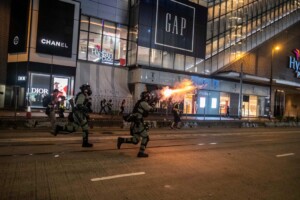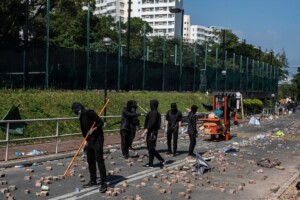Widgetized Section
Go to Admin » Appearance » Widgets » and move Gabfire Widget: Social into that MastheadOverlay zone
One country, two systems in the new era China adopts a more severe rule of governance in Hong Kong
(BOXUN) A large number of anti-government protesters in Hong Kong continued to protest in Hong Kong this week. They once formed a police conflict between the Chinese University of Hong Kong and the Polytechnic University. The demonstrators placed obstructions in various places in the Chinese University of Hong Kong, and the police once had a fierce exchange of fire with demonstrators outside the school. After the violent conflict at the Chinese University of Hong Kong escalated, some Chinese students studying at the school were instructed by the Chinese government to evacuate the school and cooperate with the official media.
Entering the fifth month of anti-government protests, the life of Hong Kong has undergone tremendous changes, the economy has fallen into recession, the government has lost the hearts of the people, and there has been a confrontation between the neighborhoods. For a long time, Hong Kong has been known for its world-class transportation, the global financial center’s shining skyscrapers and its cosmopolitan aura, but the protest storm has subverted this image and may change Hong Kong’s identity.
With each escalation of the protests, the differences between the two sides seem to be getting bigger and bigger, and the possibility of a peaceful ending is getting smaller and smaller.
The violent clashes with the police and the massive arrests of protesters have eroded confidence in the local government and the legal system. These have always been the hallmarks of Hong Kong’s unique status under the “one country, two systems” policy. When Beijing regained its sovereignty in Hong Kong in 1997, it promised to keep its system.
The decisions made by the Hong Kong leadership, such as the amendments to the Fugitive Offenders Ordinance and the ban on masking laws, have deepened concerns that Beijing’s authoritarian hand has reached Hong Kong. These decisions clearly remind people that when the “one country, two systems” commitment expires in 2047, Hong Kong may become just another Chinese city.
During his visit to Brazil, China’s top leaders made the highest instructions that “seriously trampling on the rule of law and social order, seriously undermining Hong Kong’s prosperity and stability, and seriously challenging the bottom line of the principle of “one country, two systems.” Stopping the storm and restoring order is Hong Kong’s most urgent task at present. This is the second instruction of China’s top leader since the five-month protest in Hong Kong. According to outside analysis, this is the clearest signal that the CCP has released the situation in Hong Kong, including the most obscure answer to the US Congress’s progressive promotion of the Hong Kong Bill of Rights and Democracy.
At the same time, he also pointed out that “will continue to firmly support the Chief Executive to lead the Hong Kong Special Administrative Region Government in accordance with the law, firmly support the Hong Kong police in law enforcement, and firmly support the Hong Kong Judiciary in punishing violent criminals. The Chinese government’s determination to safeguard national sovereignty, security and development interests Unswervingly, the determination to implement the “one country, two systems” principle is unwavering, and the determination to oppose any external forces’ interference in Hong Kong affairs is unwavering.” Some analysts believe that this is the latest attitude of the leaders of the Chinese Communist Party on the situation in Hong Kong. In this five-month-long demonstration conflict, the Chinese government has been taking a public opinion campaign to respond to the international community’s situation in Hong Kong. Report.
Protesters in Hong Kong have adopted a more extreme approach with the CCP in deciding on the future social system of Hong Kong. Such a situation once hoped that Beijing would respond to protesters in Hong Kong, but on the contrary, it took a more difficult situation. In addition, the Chinese nationalist tabloid “Global Times”, which has a biased report on Hong Kong’s anti-government demonstrations, criticized Hong Kong’s anti-government protesters in its comments on this speech, more like the deep abhorrence of the bourgeoisie in the Mao Zedong era. , describe it as a “thug” although the term has appeared in the newspaper’s reports countless times.
The huge impact of large-scale anti-government demonstrations on Hong Kong’s finances has made Chinese leaders have to be wary of such things. The Hong Kong government today announced Hong Kong’s economic growth data for the second half of the year. The data shows that for the first time in a decade. . Many foreign business companies in Hong Kong have been making good choices in recent months to judge whether to invest in Hong Kong. Hong Kong’s currency is pegged to the US dollar, which makes the Hong Kong dollar reliable and stable. China has strict control over the renminbi and will also use Hong Kong as a prime financial station for trading and trading with the rest of the world. According to research firm Global Source Partners, Chinese financial institutions have hundreds of billions of dollars worth of assets in Hong Kong, and Chinese state-owned companies have up to 30% of Hong Kong’s assets. As a Chinese e-commerce giant trusting Hong Kong, Alibaba is expected to be listed in Hong Kong this month.
In what way will Hong Kong’s anti-government demonstrations end in the future? There is widespread concern that China will take more stringent measures to pose a far-reaching threat to Hong Kong’s social system.



